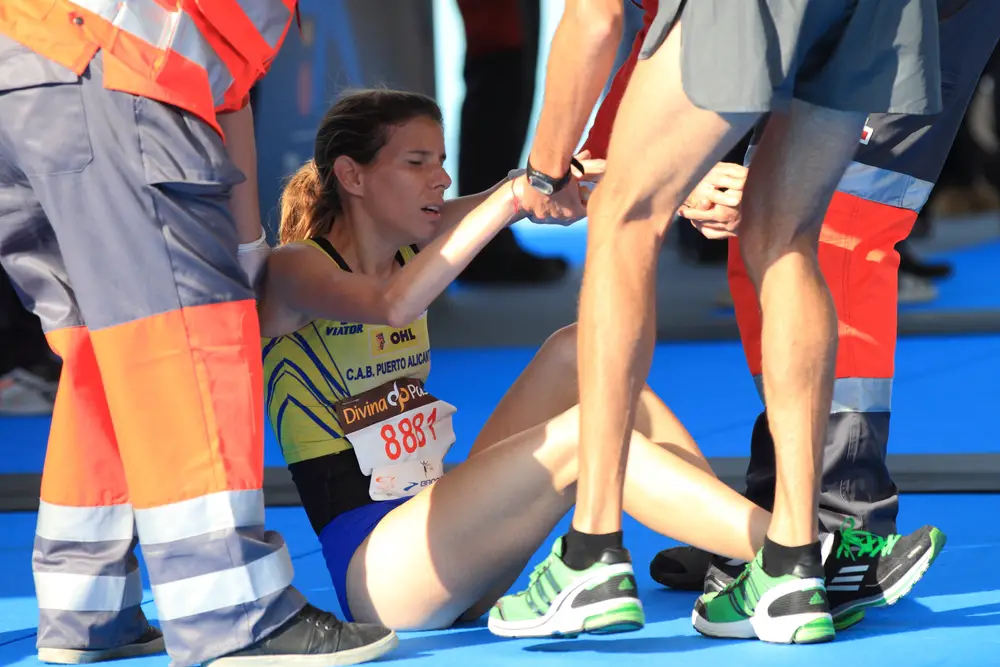If you’re out running or running next to someone and they pass out, the first thing you should do is lie that person on their back and check that they are breathing.
If possible try and lift their legs to increase the blood flow to their brain so they can wake back up.
If they're wearing tight restrictive clothing, especially around the upper body then try to remove or loosen the clothing so they can breathe more easily.

Make sure the person who is passed out isn’t having any strange muscle spasms or fitting. If they do start fitting them, turn them on onto their side, clear any possible hazards around them they could hit with their head, and possibly cushion their head with something soft like a sweatshirt if they’re on concrete ground.
If you know the person and their medical history, then you may be aware of the procedures to take in this incident, however, if you don’t know the person then it’s best to wait until the emergency services have reached you.
If they wake back up, let them rest until they feel more secure, and then make sure to slowly move the person into a sitting position and do not allow them to stand up until you’re sure they’re ok or they’ve been seen by a medical professional.
If possible try to give the person a sugary drink or a sugary snack to help raise their blood sugar levels. It will also be beneficial to get them to slowly sip on water in case they are dehydrated.
Check with the person to see if they have medical issues like diabetes, asthma, or other conditions that you can help with by either getting an inhaler for them or finding some food to boost their sugar levels.
If they are not breathing you or someone else must call emergency services straight away and you must begin CPR straight away. If you do not know how to do CPR correctly then try and find someone who does.
The basic rule for CPR is that you should perform 30 moderate chest compressions and then two rescue breaths into the person’s mouth and continue until the person regains consciousness or until the ambulance arrives or a medical professional arrives on the scene.
There are some things which you shouldn’t do if someone passes out, you should not slap or shake someone who has fainted on the floor. Unlike the films, you should avoid shouting at the passed-out person and also do not throw any water at them to try and wake them up.
Do not try and move them and if you’re in a busy environment, you should try to get someone else to block off the area and prevent people from crowding around the passed-out person.
You should also prevent the person from standing up for at least 10-15 minutes after fainting and encourage them to lay low, drink some water and stay out of the sun.
If someone passes out on hard ground whilst running they may have hit their head whilst hitting the floor or on their way down, so you’ll want to check them over once they’ve woken up to make sure they haven’t cut themselves open or badly injured themselves.
Why did I pass out after running?
Many factors can cause someone to pass out after running including dehydration, super low blood sugar levels, overexerting the body, inability to breath properly, or even hyperventilating.
Even someone who has drunk plenty of water before or during their run may experience dehydration symptoms, especially if they are running in direct sunlight and high temperatures. If you haven’t eaten enough before your run then your blood sugar levels may be too low and that’s why you’ve felt lightheaded and passed out.
If you’re not breathing properly during your runs then your heart cannot pump enough oxygenated blood to the brain and will cause you to pass out.
People with low blood pressure are more prone to passing out after running because that is the period when their blood pressure levels are at the lowest and that level can be dangerous for some people.
This is why it’s important to do a proper cool down like stretching or a slow walk when finishing up your run so you can blood pressure can drop slowly and eventually even out.
How can you tell if you’re about to pass out?
The most common symptoms that people will experience before passing out are lightheadedness, sweating, dizziness, blurred vision, nausea, headaches, and ringing in the ears.
- How Many Calories Do You Burn Running a Marathon? - May 13, 2021
- Should You Run On An Empty Stomach? - May 12, 2021
- Which Exercise Is Best for Lungs? - May 11, 2021
